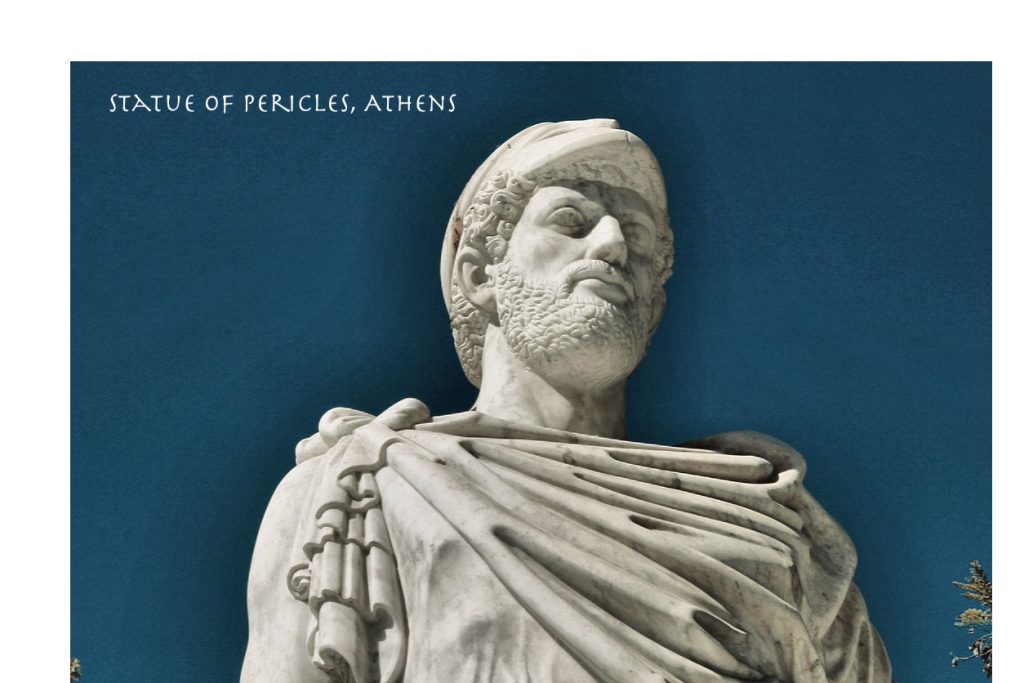
Lessons from Ancient Greece
In 430 BC, a devastating plague ravaged Athens, a city embroiled in the Peloponnesian War under the leadership of the statesman Pericles. Simultaneously, Sophocles’ tragic play Oedipus Rex was unveiled, serving as a metaphorical commentary on the events unfolding in Athens.
The play emphasised the limits of human wisdom, the dangers of excessive pride or hubris, and the necessity of humility in the face of forces beyond human control. It underscored the importance of adhering to traditional norms and the obligation of citizens to critically evaluate and rectify their leaders’ mistakes. This mirrors the global discussions concerning both covid and climate change, where certainty about The Science™ and lack of critical thinking can lead to extremely damaging interventions.
Pericles, who governed Athens during the onset of the Peloponnesian War against Sparta, adopted a strategy that was influenced by a realistic assessment of both Athenian and Spartan capabilities. Recognising Athens as a dominant sea power and Sparta as a superior land force, Pericles concluded that a direct confrontation with Spartan armies would be a losing proposition for Athens. In a move that demonstrated his tactical acumen but also a failure to foresee the devastating consequences, he implemented a lockdown, moving the population of the Attica countryside into the walled city of Athens.
This fortified position was thought to provide a stronghold against Spartan attacks, while Athens’ formidable navy ensured the maintenance of vital trade routes and food supplies, particularly grain from the Black Sea region (a pre-internet doorstep delivery service). However, the overcrowding and unsanitary conditions within the city walls inadvertently bred a devastating plague impacting the morale and fortitude of the Athenian populace.
During this tumultuous period, almost all the citizens of Athens would have attended a major religious festival during which Oedipus Rex was performed. The play begins with a chilling prophecy foretelling that Oedipus, son of King Laius and Queen Jocasta of Thebes, is destined to commit patricide and incest. In their desperation to avert this fate, his parents order a servant to abandon the infant Oedipus. However, Oedipus is eventually adopted by the King and Queen of Corinth, leading him to live his life ignorant of his true origins.
As a grown man, Oedipus flees Corinth, having heard a prophecy that he would bring harm to his (adoptive) parents. En route, he encounters and kills King Laius, his biological father, unknowingly setting in motion the fulfilment of the prophecy. Arriving in Thebes, he liberates the city from the Sphinx’s curse, earning the throne and the hand of the widowed Queen Jocasta, his biological mother. He also earns the adoration of his people and throughout the play the chorus blindly trusts in him. The prophecy’s terrible irony is revealed only when a plague afflicts Thebes. The Oracle of Delphi states that the plague will lift only when the murderer of Laius is discovered and punished. Unaware of his own guilt, Oedipus vows to uncover the murderer, setting in motion an investigation that eventually reveals his own sins of patricide and incest. The steps he took to avoid the prophecy led directly to its fulfilment. Overwhelmed by guilt and the realisation that his actions have brought about the plague, he blinds himself and chooses exile
The narratives of Pericles and Oedipus intertwine around themes of leadership, crisis management, and the repercussions of actions taken with good intent yet devastating outcomes. Both leaders sought to protect their citizens, aiming to prevent greater harm but instead being responsible for subsequent deaths. Oedipus Rex offers a profound exploration of wisdom’s limits and the pitfalls of overconfidence. The downfall of Oedipus stems from his misguided belief in his capacity to control his destiny and his ignorance of his true identity, serving as a critique of the way Athens was being led at a time when Pericles wielded significant power. Sophocles’ tragedy serves as a sobering reminder that despite their best efforts, humans are often subject to forces beyond their control.
In a modern context, the narrative of Oedipus Rex and the actions of Pericles serve as stark warnings against the dangers of hubris and the hazards of trying to fully control or predict the course of natural events. Boris Johnson, who proudly displayed a bust of Pericles on his Downing Street mantelpiece, had clearly not taken on board this lesson from his political hero when trying to control covid with lockdowns.
In the context of climate change, for instance, there seems to be an overemphasis on humanity’s impact. While human activities indeed impact our planet, the Earth’s climate system is vast and complex, influenced by myriad factors beyond our control or complete understanding. This hubris overlooks the vastness of the universe and our planet’s history compared to our relatively short existence. Scientists –whether they are climate experts or not – might do well to remain humble in the face of nature’s complexity and volatility.
Indeed, a humble recognition of our limitations and an understanding of our insignificance in the face of vast natural forces – such as volcanoes, solar cycles and exothermic core effects – can be liberating. It can alleviate the anxiety that comes with trying to control everything and enable us to accept risks, leading to more fulfilling lives. Moreover, acknowledging the limits of our influence can refocus our attention on environmental issues that are within our control, such as reducing pollution and protecting wildlife habitats, which are often neglected in the discourse on climate change.
As Sophocles illustrates, it’s not the prophecy but Oedipus’s misguided efforts to control it that lead to his downfall. This principle is crucial when examining current societal reactions to complex crises such as covid and climate change. The fervour with which The Science™ is held as the absolute truth, and the reluctance to embrace uncertainty or alternate viewpoints, can dangerously transform scientific practice into blind faith. Trusting a few powerful people to always make the right decisions is a recipe for disaster.

